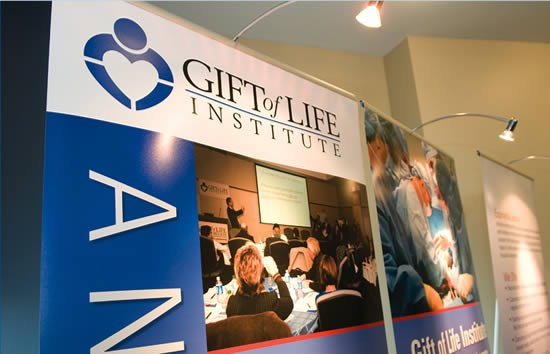Consisting of 14 modules, approximately 20 minutes each, this interactive series provides both new and re-orienting Hospital Development (HD) professionals with strategies on building hospital partnerships and hard-wiring standards of practice that are critical for optimizing donation outcomes.
Developed by Gift of Life Institute and Gift of Life Donor Program (GLDP), “Orientation to Hospital Development: Your Role in Building Life-Saving Hospital Partnerships” incorporates best practices from GLDP, the largest OPO in the United States. Joe Paparo, a Hospital Services Coordinator at GLDP states, “An HD professional wears many hats – relationship builder, strategist, educator, change agent, negotiator, and communicator. This eLearning series provides a solid foundation on which to balance these roles.”
Bob Norden, Senior Curriculum Designer at the Institute says, “Through our consulting and training with other organizations, we saw a very real need for HD orientation within the OPO community.” Norden continues, “This program was developed by experts in the field, who have a combined 65 years of experience.”

To enroll in this course, please click on this link. To celebrate the Institute’s 20th Anniversary, use the coupon code 20% Off at check out to receive $140 off the purchase price – good until July, 1 2024.
Following is information on each module in the series:
HD Philosophy and Strategy highlights the overarching goals and strategies for improving and maintaining an optimal organ donation process in partner hospitals, positioning clinical practice messages that resonate with hospital partners, and how to effectively influence positive change.
Overview of the Donation and Transplantation System provides an overview of the donation and transplantation system, including the role of the OPO, the historical need for regulatory oversight, and the transplant wait list.
Tissue Donation Process explores the tissue donor referral process and the OPO’s response, uses for transplantable tissue, and the tissue recovery process.
Determination of Brain Death outlines the basics of pathophysiology and assessment of brain death, the principles of delivering brain death news to families, and talking points and messaging for a high-level discussion about brain death declaration in HD presentations.
Organ Donation Process identifies the causes of death in potential organ donors, the organ donor referral process and the OPO’s response, hemodynamic and ventilatory support for potential organ donors, and the distinctions between donation after brain death and donation after circulatory death.
Organ Donation Pathways provides a foundation for understanding clinical management and its importance in maximizing the quality and quantity of organs for transplant.
Family Care and Communication describes the impact of a systematic, timely, and collaborative family communication strategy that is both sensitive to the family’s needs and optimizes the likelihood that they’ll authorize donation.
Delivering a Core Presentation explores the components of a sample core presentation for educating the care team about donation, including the importance of pre-authorization standards of practice.
Core Presentation – Return Demo provides learners with an opportunity to give a return demonstration of the core presentation, as if they were presenting donation information to an audience of critical care physicians.
Communication Strategies reviews the donation process from the hospital care team’s perspective and provides learners with a framework for responding to their questions or statements using an active listening algorithm.
Communication Strategies – Return Demo reinforces effective communication skills where learners, after hearing typical questions from hospital partners, will share responses, incorporating everything they’ve learned from the previous modules.
Hospital-Based Interactions provides learners with a top-down sampling of meaningful interactions where they’ll learn about platforms and forums for engaging hospital partners in ways to improve their clinical practice and donation outcomes.
Hospital Assessment and Planning explores the need to develop a customized, hospital service plan, based on donation-specific performance indicators and the identification of influential hospital contacts.
Hospital Service Plan Development details how to utilize the skills acquired in the previous module to develop and submit a hospital service plan to gather and analyze hospital-specific pre-authorization data and donation outcomes.

